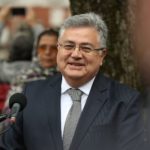Tension that has been longing between Kosovo and Serbia for years have mounted, once again. Serbia’s upcoming elections, scheduled for April 3rd, 2022, have raised tensions between the two countries. The Kosovo government rejected the demand from Quint countries — including the United States (US), Britain, France, Germany, and Italy — that Serbs in Kosovo vote in Serbia’s general elections.
The Quint countries, also known as the Five-Group, responded to the Kosovo Government by saying “we note the decision as a disappointment.” In another development that has sparked tensions between the two countries, Kosovo Prime Minister Albin Kurti fired the head of the Mitrovica Court, Serb-born Ljiljana Stevanovic, for attending a meeting of the National Security Council in Serbia. Serbian President Aleksandar Vucic reacted by saying, “Kosovo Prime Minister Kurti decided to attack the Serbs.” Serbian Prime Minister Ana Brnabic said Kosovo has applied violence against Serbs in the country, explaining that the leadership in Pristina had violated international agreements and therefore the Brussels Treaty was out of date. Protests were then held in northern Kosovo due to the lack of voting in Serb-dominated municipalities.
There has been a question of how these developments that are escalating tensions will affect the dialog between the two countries, which has been under the auspices of the European Union (EU) since 2011. EU High Representative for Foreign Affairs and Security Policy Josep Borrell also said that in the days ahead the dialog was not going well and that he was disappointed. Experts, who assessed the process between Kosovo and Serbia with the Ankara Center for Crisis and Political Research (ANKASAM) considering the latest events, say the problem between the two countries is difficult to solve.
ANKASAM Eurasia Consultant Assoc. Prof. Nuri Korkmaz: Serbia has faced a similar problem with Montenegro.

According to ANKASAM Eurasia Consultant Assoc. Prof. Nuri Korkmaz, between Kosovo and Serbia, where a relapse exists due to elections, there is a setback. Dr. Nuri Korkmaz said the experience undermined the dialog between the two countries. “Kosovo needs both EU countries and the US to; So, he received a lot of criticism from all the Quint countries. This is because it is interpreted as preventing Kosovo from exercising its constitutional rights for Serbian citizens. There is also concern about the war in Ukraine that Belgrade’s government might also undertake some initiatives in the Balkans,” he said.
Korkmaz highlighted that Serbia had similar problems with Montenegro, noting that the past elections in the country did not exactly respond to the Belgrade administration’s request to open five ballot boxes and that two were opened.
Ankara University Professor Çınar Özen: The major problem between Kosovo and Serbia is that Mitrovica’s future is uncertain.

The future of Mitrovica, a Serb-dominated province in the north of Kosovo, remains uncertain, as the crisis between the two countries continues, according to Professor Çınar Özen of Ankara University, who said that rising tension due to the elections would make Kosovo Prime Minister Kurti politically weak.
Özen emphasized that Mitrovica is not actually in Kosovo. “There should be something in common about the future of Mitrovica. The Serbs are there, acting on their own. The EU needs to decide what needs to be done about this. Unless it has been completed, similar crises will continue to occur.” he stated.
Özen also claimed that Russia’s policy towards the Balkans has changed. He said Kosovo and Serbia have stabilized the Balkans through EU enlargement policy. “While these countries are part of the enlargement policy, they are states that cannot take part in the EU in the future. The EU has no influence on Serbia. Because Serbia has pro-European and anti-European parties. Here, the EU can help bring Serbs to a more conciliatory point, as much as it can turn public opinion in her favor. To do so, she needs to promise Serbia a membership, but this does not happen and Russia’s hand is strengthening naturally. The main weakness of the EU is the stalling of its enlargement policy. Otherwise, the EU would not like to see such a conflict in the Balkans; Because the order he established in the Balkans would be devastated.”
Professor Darko Trifunovic, Director of the Serbian National and International Security Institute: One should be optimistic, though many successes have not been reached.

The process of ongoing dialog between Kosovo and Serbia has not changed significantly, according to Serbian National and International Security Institute Director Professor Darko Trifunovic, who said international politics play a major role in Kosovo. Emphasizing the US’ role in the Balkans, Trifunovic said, however, that Kosovo Prime Minister Kurti would have to consider requests from Wahsington.
Trifunovic said that Kosovo is not seen as an internationally recognized state; the problem of recognition was present and that he was therefore not a member of the United Nations (UN). He said that this would not happen without Serbia’s consent and that even if the EU-mediated talks did not yield much success, optimism should be exercised.
In addition, Trifunovic said, “The negotiations need to be approached rationally. You have to see exactly what is accepted and what is not done. If it is not, then the negotiations will not go in the right direction.”
Retired Ambassador Hüseyin Diriöz: Quint’s anti-Kosovo stance could spell trouble for the country.

Stressing that the EU has a significant influence in the dialog between Kosovo and Serbia, Retired Ambassador Hüseyin Diriöz said that now is not possible to resolve tensions between the two countries. “I think that the closer the EU holds the chances of the two countries’ accession, the easier the solution will be.”
Discussing Quint countries’ demand for an election, Diriöz says “The EU and Quint support both continuing talks and voting by Kosovo Serbs through the rhetoric of democratic rights. This could spell trouble for the Pristina leadership. It is not good that Kosovo is against Quint,” he said.
Retired Staff Ünal Atabay: Voting by Kosovo Serbs violates Kosovo’s sovereignty.

Referring to the Brussels Agreement signed between Kosovo and Serbia in 2013, Retired Staff Ünal Atabay claimed that the parties did not want to comply with the agreement and that the process was not sustainable because he believed that some sovereign rights were being violated.
Breaching the Brussels Treaty has fueled instability in the Balkans, Atabay said. “Serbia does not recognize Kosovo and considers it its own territory. As such, even in order to solve the most basic sovereignty issue between the two countries, the EU’s mediation is insufficient and ineffective.” he said.
Atabay cited electoral tensions between the two countries, saying “The fact that Kosovo Serbs voted creates a future sovereignty concern for Kosovo. This situation is unacceptable to Kosovo; because it is a matter that will violate the sovereignty of Kosovo. So, Serbia has no good will in this case. Serbia says it has the initiative to lead Serbs in Kosovo. That’s where the trouble comes from. So, neither has the EU’s mediation initiative, nor are normalization processes failing.” assessments.
Finally, Atabay addressed the EU position as well, saying “The EU is trying to corner Kosovo. But there is no Russian factor. Russia actually makes some manipulations in the Western Balkans via Serbia. In short, the EU is undermining Russia’s efforts, squeezing Kosovo and plunging the region into instability. And that’s where the error comes in. So the peacekeeping mission does not come true.”
Journalist Bayram Pomak: Among Kosovo and Serbia, the main problem is the Union of Serbian Municipalities.

Kosovar journalist Bajram Pomak says talks between the two countries have reached a major deadlock, especially over political issues. He says the process is made more difficult by a team reflecting Kurti’s nationalist profile. “At the moment, negotiations have stopped. The ongoing dialog process in Brussels has entered a major deadlock.” he said.
The most fundamental problem in the dialog process is the fact that Kosovo does not allow the formation of the Union of Serb Municipalities, Pomak said, adding that the agreement to establish the Serbian Union of Municipalities was in breach of the Kosovo Constitution and the EU could not find a solution to this issue. “The process is not moving forward. It seems to stay that way. At the moment, we see that the parties are not in a position to talk. It is not expected that the EU will make an intensive effort on this issue, due to the Russia-Ukraine War.” assessments.
